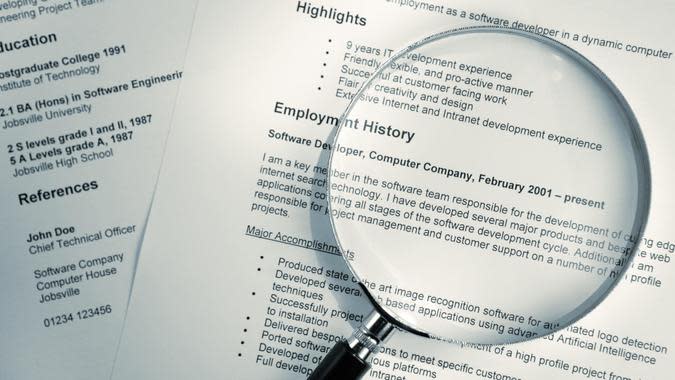Top Resume Mistakes That Hold Job-Seekers Back

When you apply for a job, your resume is usually your first impression -- so you want to make it a good one. And if you haven't been getting called for interviews for many of the jobs you're applying to, it's possible that you've made a resume mistake that's stopping recruiters from reaching out. Fortunately, if you know what the mistake is, you can fix it.
Take a Look Back: 2022 Year in Review
Read More: 3 Easy Tips To Turn Your Credit Woes Into Wows
GOBankingRates spoke to recruiters, career experts and professional resume writers to find out the common resume mistakes that may be preventing you from getting to that next step. Here's what the top mistakes are.

Your Resume Is Full of Typos
Paul Dessert, founder of the resume writing and career resource site Resume Beacon, said that "the biggest mistake by far is typos."
"We analyzed a set of 10,000 resumes and found that 68% of them had at least one typo," he said. "Of these 10,000, only 22% landed a job using the flawed resume."
Take Our Poll: Do You Think Student Loan Debt Should Be Forgiven?

Your Resume Doesn't Include Relevant Keywords
Many recruiters rely on applicant tracking systems to screen applicants automatically. These systems search for relevant keywords within a resume, so if your resume doesn't contain the right ones, it might not even make it to the step when it's reviewed by a human.
"Most people don't know about applicant tracking systems and the importance those systems play in the job hunt," Dessert said. "We constantly coach people about the importance of adding keywords in their resumes. Adding relevant keywords will give you a higher overall score, and your resume will have a better chance of being reviewed by the HR team."
Read: 6 Career Mistakes To Avoid During an Economic Downturn

You're Using the Same Resume for Every Job Application
"The biggest red flag I see while reviewing resumes is that people are sending the same resumes out for every job application," said Caitlin Proctor, a certified professional resume writer and career expert with ZipJob. "Instead, you need to tailor your resume for this one job at this one company. That means your resume is less about you and more about the company's needs."
Look at the job description, and make your resume's skills and work experience sections fit with the description as best as you can.
"Use keywords to guide which of your unique accomplishments and projects you include on your resume," Proctor added. "Cut out anything that is not relevant to the position. This thoughtful trimming and expanding will show that you are not a one-size-fits-all candidate: you're the right fit for this specific job."

Your Resume Doesn't Highlight Your Accomplishments
"The biggest mistake that I see is providing job duties instead of accomplishment-based metrics," said Myca Harrison, career coach, resume writer and founder of Pivotal Quest Consulting. "People will list a ton of bullets on their resume filled with information of what you would see in a job description, but no details on how that person impacted the organization through their achievements."
Recruiters are more interested in your results than a laundry list of your past job responsibilities.

Your Resume Includes Too Much (Irrelevant) Information
"Another huge mistake that I see all the time is overall too much information on the document," Harrison said. "Pages and pages full of every job and every duty ever performed is a sure way to have your resume passed over. The manager or recruiter is only spending a few seconds scanning over the document, so the information must be impactful and value-packed."
This goes back to tailoring your resume to the specific job you are applying for -- trim the fat so that everything on the page is relevant to the job you want.

Your Resume Is Hard To Read
"Formatting does make a difference," said Christy Noel, career expert and author of "Your Personal Career Coach: Real-World Experiences for Early Career Success." "Craft a resume that is not hard to read. Include white space and an easy-to-read font -- don't use an extra-small font size to get more information on the page."
Noel also recommends using bullets for your success metrics and skills: "These are easy for a hiring manager to spot and review."

You Have an Unprofessional Email Address
Everything on your resume should be professional, including your email contact information.
"One of the deadly sins associated with resume writing is having an unprofessional email address," said Max Woolf, a career expert at ResumeLab. "Before applying for a job, make sure to set up a professional email address that only contains either your name, initials or digits, and generally steer clear of anything that might be considered questionable. Otherwise, your resume will likely end up in the bin."

Your Resume Doesn't Explain Gaps in Employment
"We tend to think of long periods of unemployment as red flags, but since millions of jobs have been displaced due to the pandemic, these gaps are more common," said Liz Cannata, vice president of human resources at CareerBuilder. "If you have experienced unemployment this year due to pandemic-related closures, or at any point in your career, you are not alone. In your resume and your cover letter, be honest about gaps in employment."
In addition to explaining why you have employment gaps, you should also highlight any skills, experience and knowledge you gained during your period of unemployment.
"If you developed skills as a caretaker, gained experience volunteering in your community or completed online coursework to advance your skills and become a more desirable candidate, make sure to include that in your application," Cannata said.

Your Resume Omits Information or Has Inconsistent Information
"Basic information like previous job titles and dates of employment should be consistent between your resume, CV and online profiles on job search sites like LinkedIn," said Matt Erhard, an executive recruiter and managing partner at Summit Search Group. "At best, inconsistencies make it seem like you have poor attention to detail, and at worst, it can seem dishonest. The same is true if you omit this kind of information. Remember, you don't need to list your full employment experience on your resume, especially if you're at the mid-point or later in your career, so if you're self-conscious about some aspect of a job, it's better to leave it off entirely than to selectively omit details."
More From GOBankingRates
This article originally appeared on GOBankingRates.com: Top Resume Mistakes That Hold Job-Seekers Back

 Yahoo Sports
Yahoo Sports